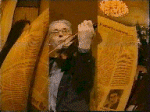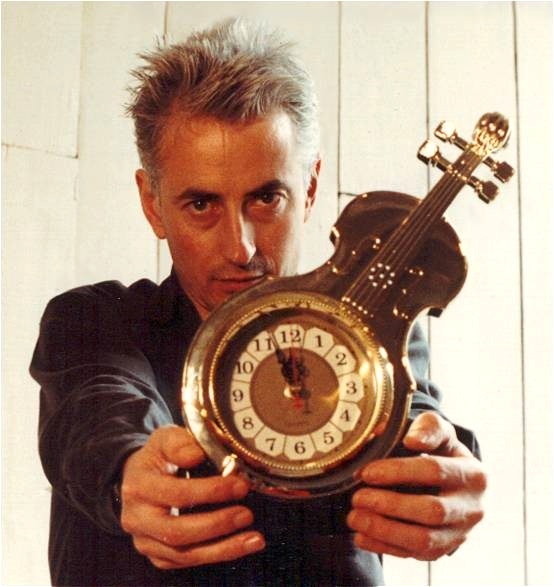Press Quotes 1996-2000
Jon Rose
what others say

This page consists of descriptive reviews from from The Wire, Sunday Times (London), Der Tagesspiegel, Option Magazine, The Sydney Morning Herald, The Guardian, Coda magazine, Realtime Magazine, Montreal Voir, Salzburger Zeitung, Time Out New York, The Boston Phoenix, All About Jazz, Süddeutsche Zeitung, De Volkskrant, Frankfurter Rundschau, Time Out, The Oregonian, and many more.
'Few experimental composers or improvisers divide opinion as sharply as Jon Rose. He is maybe an erratic talent but when he hits the mark he takes you to places other composers wouldn't dream of. PERKS is arguably his finest multimedia piece to date... an inner world as freakishly hilarious as it is disturbing... a work of extraordinary imagination and originality.'
The Wire
'There is Jon Rose, he never conceals his desire for innovation and having fun - he is an incorrigible experimenter. This Relative Band Concert was a speech for the defence. Die Avantguardisten haben doch Recht!'
Salzburger Zeitung
'A Jon Rose concert conceives of the violin as a medium through which artistic and cultural commentary is compressed and expressed while its potential as a musical instrument is destroyed and reconstructed. Situated, along with the piano, at the very core of high culture music-making, the violin, in Rose's hands, is turned into a weapon against the ordered world that reveres it.'
On The Street Magazine, Australia
'Larger than life characters leap out of the loud speakers and into my living room. The idea seems to be that we're all mad here or (should) play the violin.'
Resonance Magazine
'Festival report from Beijing... as the old Chinese wisdom says 'Men leave behind their name, the wild geese leave behind their cries'. The violinist and computer freak Jon Rose performed his devastation music, with his devastating colleague Otomo Yoshihide, a disturbance from Hell.'
Hamburger Abendblatt
'Jon Rose is more than simply a curiosity, he molests our sense of profundity.'
El Pais, Spain
'On Sunday, mad Australian violinist offered a scathing take on virtual reality and other pop-culture fools' gold in a Monty Pythonesque theatre work called Violin Music in The Age of Shopping.'
Toronto Gazette
'Cornering the postmodern irony market was violinist and theatrical gadfly Jon Rose... a work in progress was wry and bursting with ideas.'
Fringe Beat
'A sense of humour that rubbed both ways. The uneasiness is with me to this day as I have the feeling that the audience was right where he wanted us and he worked us masterfully. I can still picture him behind his desk, impeccable, with his decadent smile and violin.'
Coda Magazine
'Violin Music in the Age of Shopping' revealed at the same time a drole and brilliant mind. The musicians of SHOPPING came from the four corners of the Globe.'
Montreal Voir
'The Shopping project turned out to be a turbulent musical, complete with truly incredible renditions of really bad songs (Feelings, etc).'
VOX Magazine, USA
'I begin with the brilliant, awe inspiringly wacky Jon Rose. The chronically surrealistic lag that Rose is on, has a great peak on EINE VIOLINE FÜR VALENTIN... satirises Nazis, violin education, perhaps even me the critic, and me, the listener. The improvising is huge and great... dig in heavy hearted philosophy types; it'll be a nice break.'
Ink Webzine, USA
'However there was compensation provided by a few bent anarchists making sharp conceptualizations about the careful boredom (of The Berlin Jazz Festival). An example of this uprising was Karl Valentin, a virtual icon of contradictorary craziness, covered by Jon Rose in his wild and funny homage... the 'realness' comes not just from imagination, the craziness not just from reasoned differences; the real quotations stand next to the fake quotations because we all live in a phantasma of sound and noise, we have no other function than to stand relative to one another. Jon Rose offers a vital music farce with full eruptive power and anarchist humour. Where others fail with musical incapability, there Rose bases his humour, as a Dadaist ghost, with heaps of musical ideas.'
Süddeutsche Zeitung
'The Otomo/Rose affair is a sorry-assed mess that communicates nothing.'
The Wire
'Our Australian violinist has abandoned the 'shopping saga' for the decadence of the 20's and 30's (Eine Violine für Valentin)... Our violinist of 'violining' goes around the idea, makes it bigger, between charm and destruction, with a diabolical dexterity.'
Review et Corrigeacutee
'For the Festival Sonambiente, Jon Rose has created a homage of interactive objects trouvés for the passionate collector, sport & body fanatic, clothes designer and sadomaso fetishist Percy Grainger... a great world premiere. Video projection shows naked men and women at play while 2 human brain halves provide a contradictorary dialogue. Grainger's somewhat shrill mother gets a sonic episode all of her own, the most beautiful moment.'
Frankfurter Rundschau
'A Happy drug for the senses... the world premiere of the interactive Badminton game PERKS with film projections, word puzzles, screams and groans, and a lot of noise that floods all the available channels of the audience's senses; an overstimulation of disturbances, sharp cuts and drumming on the skins of the loudspeakers. The keys of a mechanical piano move like ghosts; 2 Badminton players play their optical overs and unders in the emptiness...'
Der Tagesspiegel
'The theme of Ars Electronika this year was - Memesis, the future of evolution. PERKS celebrated this with satire and the spirit of contradictions, giving a surge of feelings and images, better than any speech... it evoked the complexity of the brain and interrogated a post biological evolution. In its accomplishment, relative simplicity, and musical creativity PERKS ridiculed the debauched instruments and super slick production of the MIT Tod Machover Brain Opera.'
Art Press International
'This is an amazing, absurdist masterwork. Or it's a gawdawful mess. Or it's somewhere in between, or somewhere else altogether... but it's absurdity is never in doubt. One clue is a vocal part that moves from Schoenbergian intervals to a polka to a chicken in less than a minute. Another is the choice of violin and trombone as primary solo instruments - obviously the piece was written by an extremist. The sampled, sometimes scrambled voices provide more evidence of a bizarre, unfettered sense of humour at work. The applause emanating from the audience at times indicates there is pleasure to be derived from this music. Imagine a vague parallel with Frank Zappa's 'Yellow Shark' album and at least you'll be in the ballpark (or is that a soccer stadium or music hall?)'
Option Magazine
'Few opening nights have been as utterly wierd as this one... where was the monkey?'
The Brisbane Courier-Mail
'With bow amplification and a vast array of sampled sounds, Rose's violin is less an instrument to be played than a lens for viewing chaos. Hurtling in performance into the farthest frontiers of counterpoint... The various devices enable Rose to produce sound by playing one bow on another, by waving the bow like a magic wand or simply by moving his body. 'The Chaotic Violin' was not short on physical humor, and at times Rose came off like Buster Keaton, animated by his own haplessness in the face of incipient mayhem. When Rose played in the conventional sense, bow to strings, he was ferocious, a postmodern Paganini with the digital words at his fingertips. It was in these sections that the music was most enthralling, as the voice of the violin emerged in clearest counterpoint to the accompanying acoustic effects. Two of the five lengthy improvisations achieved differences of character, largely through texture, but all shared a uniformly frenetic tenor. Perhaps that's just the nature of chaos.'
The Oregonian
'Certainly the most eccentric, and perhaps most interesting release is FRINGE BENEFITS (Entropy 006), a double cd by Jon Rose, gathering seventy selections from a nine year span. Subtitled 'an Australian Archive 1977-1985', Rose and company started Fringe Benefit in 1977 as a small organisation in Australia to promote and record improvised music. From numerous tapes, he's culled these snap shot experiments. Included are concert extracts, environmental episodes made with binaural microphones, as well as some impressive studio romps. There are many violin based instruments used, the wild creations of Rose himself, including a huge Tromba Mariner, a double-piston wheeling violin, sixteen-string long neck violin, well strung ironing board, and a half-size megaphone violin with FM microphone. Oh, lest I forget, there's also the nineteen-string violin, unfortunately stolen in '81 from a car in London. You also have a cattle train, cameo by Maggie Nicols, traffic accident, airport take offs and landings, a revolving speaker powered by a washing machine motor, and the sound of a cheap cassette tape feedback loop melting in the sun, interspersed with some dynamite small group skirmishes. This is radical ambient music intended to wake you up rather than put you to sleep. It succeeds. As Rose warns in his notes, not to be listened to in one sitting. I read them too late.'
Coda Magazine
'The Fence as an instrument is a gift. The sounds of Golan Heights villagers, divided by 200 meters of no man's land between Syria and Israel, calling across for news of relations, is truly heart-rending.'
The Sunday Times, London
'String Thing: Rose took the stage... his half-hour set was a wacky one-man-band theatre piece in which the straight-faced musician controlled a surreal barrage of vividly imagistic sounds through digital sampling, foot pedals, gestures, and virtuoso instrumental playing. It was impossible to tell whether man or machine was making some of the sounds, and in the end it didn't matter. What did count was the dizzying stream-of-consciousness flow of music. Rubbery sploings bounced off hyperactive castanet clacking as Rose unfurled long ribbons of dashing and darting violin lines. Cheesy synthesizer sounds, birdlike twitterings, and the sound of cracking knuckles gave way to pizzicato violin with a sampled orchestral background that jump-cut to low pulsing drones, crashing cymbals, and a sustained chromatic fantasia on the violin. When the sampler threw out the sound of a banjo, Rose interrupted the music to tell a few banjo jokes and eventually started rubbing the violin on the floor. Deadpan to the end, he said he thought he'd stop, before things got out of hand.'
The Boston Phoenix (USA)
'For Jon Rose, one violin is not enough. Two violins barely cut it. On The Hyperstring Project, Rose works with his violins, a midi bow, and independently operable footpedals driving sampled instruments. Using this setup (and some extra electronics), he becomes a one-man improvising orchestra capable of playing three or four voices at a time. No edits, no overdubs: this material is played live. There are two ways to approach The Hyperstring Project. One is to study the intimate technical details of Rose's personally developed electro-acoustic technology, which has enough intricacies to indulge hundreds of listenings. The other approach is to simply absorb the universe of sound as it expands in front of you. While some of the material involves conventional tunings and harmony, there's an abundance of odd intervals and dynamically evolving textures. When you press play, you must be prepared to take an abstract voyage through twisted human consciousness: the old rules no longer apply. Either way, Jon Rose is a genius. This recording is a gift - a masterpiece of technology and artistry. For one player to assimilate all these sounds and assemble them into a coherent whole (live!) is almost superhuman.'
All About Jazz Magazine
'In contrast, Jon Rose's Hyperstring Project was like a wake up call. Show casing 90's experimental technique and technologies in a virtuosi performance, Rose transformed his instrument (violin) from fiddle, to banjo and on to complete string section through the use of live interactive electronics.'
Live Art Magazine (UK)
'In the weekly concerts of 'Kraakgeluiden' now and then one hears the real greats of this genre. Jon Rose is a radical musician, who not only is a master of his instrument, but also interested in the possibilities of sampling and sound manipulation... last week, from the first moment, he made his position clear. Rose stayed in an area from which he could compose neo classical violin sonatas, pizzicato bombardments, and bring splendid sudden stops from his bow. Who first hears his performance, must listen now with other ears to the classical violin sonata.'
De Volkskrant (Holland)
'At a certain point, restlessness can merge into insanity. (I couldn't tell you exactly where that point is, because I'm long past it myself.) Extreme violinist Jon Rose has proven over and over again his restless desire for creative momentum. I'm not really sure where he stands with respect to sanity--but the music he makes is unique, in the most extreme sense. His recent disc 'The Hyperstring Project' on ReR presented a definitive thesis on the integration of improvised violin with interactive electronics. 'Fringe Benefits', a 2-disc 1998 retrospective, summarizes his experimental violin theatrics during his fertile 1977-1985 period in Australia. The sound quality on 'Fringe Benefits' varies widely from distorted and noisy to sharp and clear, but at many points the noise appears to be part of the performance. As a warning up front, Rose announces that "it is not intended that these CDs be listened to in one sitting... and that's a health warning!" He has a point. Only a listener with incredible stamina could sit through his works for cattle train and violin, fly trapped in violin, polystyrene two-string violin, violin played knee deep in the surf, violin with airport taxi and takeoff, and Chinese 1/4 size violin with 50 feeding parrots. And that's just a sampling off the first disc. The point of this music (as can best be deciphered from the sheer randomness contained within) seems to be to explore every possible geometry, compositional framework, electronic effect, and performance style possible on the violin. Of course that's an infinite list, but Rose makes a striking effort to approach some of the more interesting possibilities. His playing ranges from straight country and western (no kidding) through more restrained 'composed' sounding passages to all-out scratching, screaming noise. No doubt Rose is a virtuoso; plenty of doubt he's sane; and extraordinary doubt that the average listener will enjoy his music. But if you've got an interest in experimental music, this 2-disc set provides a fantastic diversity of material. 'Fringe Benefits' certainly gives a welcome background for anyone interested in the genesis of Rose's current highly-developed interactive electronic style.'
All About Jazz Magazine













